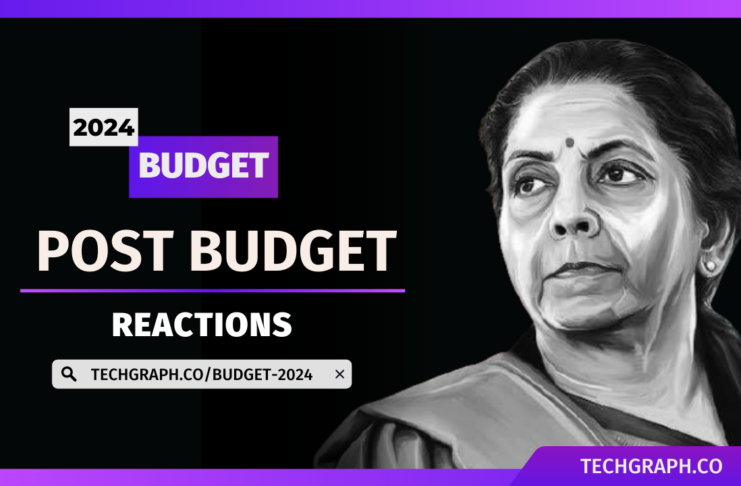In a measured response to Finance Minister Nirmala Sitharaman’s proposed interim budget for 2024, the leaders from the real estate, and infrastructure sector have vouched their reactions, expressing optimism about the potential impact on India’s housing and infrastructure landscape.
Here are the insights from industry leaders:
Dhruv Agarwala, Group CEO, REA India (Housing.com, Proptiger.com and Makaan.com)
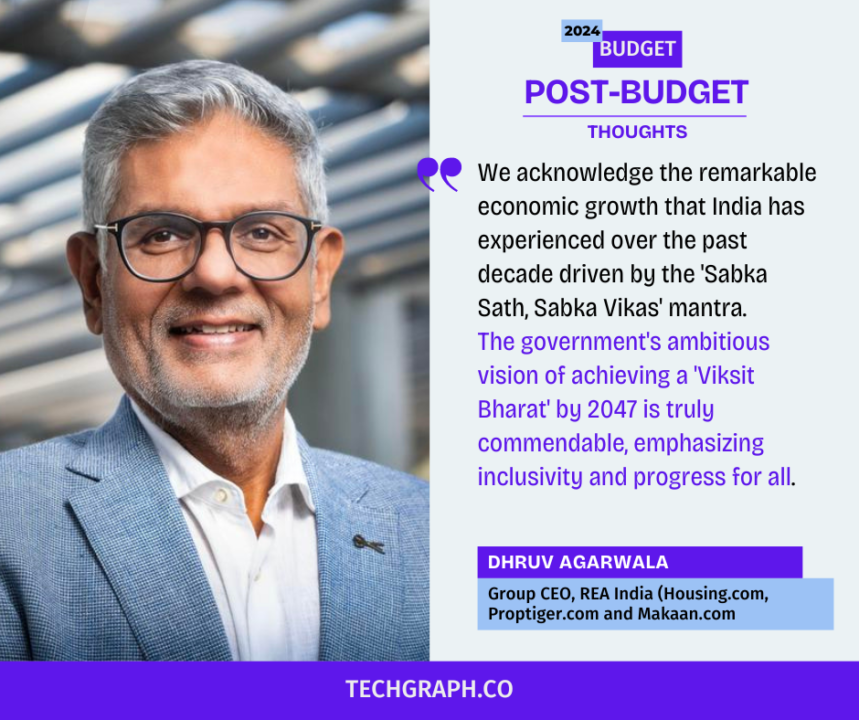
We acknowledge the remarkable economic growth that India has experienced over the past decade driven by the ‘Sabka Sath, Sabka Vikas’ mantra. The government’s ambitious vision of achieving a ‘Viksit Bharat’ by 2047 is truly commendable, emphasizing inclusivity and progress for all.
The soon-to-be-launched housing scheme, aimed at supporting the middle class in owning their homes, is poised to be a significant boost to the housing sector in a country where an increasing number of people are entering this income category each day. Industry estimates suggest that India’s middle class is set to nearly double to 61% of the total population by 2047, up from 31% in 2020-21.
Another critical driver of growth in the housing segment is the government’s commitment to enhancing infrastructure and connectivity across the nation. Allocating 3.4% of the GDP to targeted initiatives will yield widespread benefits across various sectors. In the short to medium term, Tier-II and Tier-III cities can anticipate increased economic activity due to these concerted efforts.
In conclusion, the Finance Minister’s budget presents the housing sector with a promising outlook for the future.
Pushpender Singh, MD, JMS Group
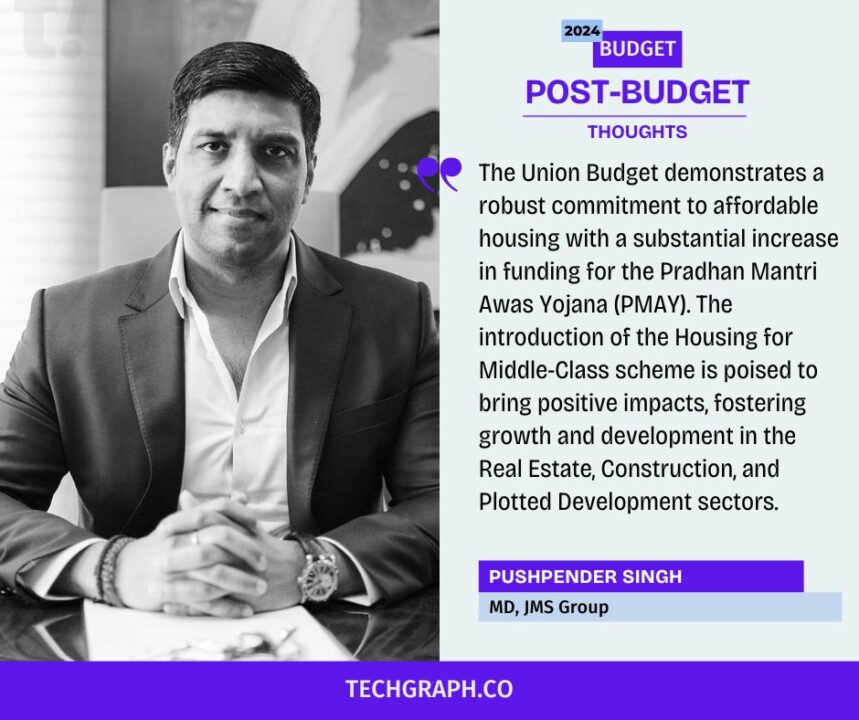
The Union Budget demonstrates a robust commitment to affordable housing with a substantial increase in funding for the Pradhan Mantri Awas Yojana (PMAY). The introduction of the Housing for Middle-Class scheme is poised to bring positive impacts, fostering growth and development in the Real Estate, Construction, and Plotted Development sectors.
Encouraging states to develop iconic tourist centers aligns with the goal of fostering local entrepreneurship. Long-term interest-free loans for state development projects, including housing, reflect a holistic approach. The focus on port connectivity and tourism infrastructure is a welcome boost, promising increased construction activities and significant potential for the Real Estate and Plotted Development sectors.
This intensified focus on housing, tourism, and infrastructure projects is set to invigorate the Real Estate sector, driving economic growth and job creation.
Chirag Mehta, Founder, Arbour Investments

This year’s interim Budget presented by Finance Minister Nirmala Sitharaman for the year 2024-25, has been a welcoming move for the Indian Real Estate. The budget presented has raised hopes for the Indian Real estate sector. The capital expenditure outlay on the Infrastructure development has been a welcoming move. Whereas easing the legal provision is a need of the hour. The possibilities of High-end Income groups investing in the sector will undoubtedly see a shift in the completion of successful residential & commercial project completion.
Priyatham Kumar, Founder, Homes247

In the prop-tech space, the budget’s acknowledgment of the Indian economy’s favorable trends—particularly in digital technologies and infrastructure—is consistent with our goals. The real estate industry is seeing revolutionary breakthroughs as a result of the focus on strengthening digital ecosystems and infrastructure.
As one of the top businesses in the sector, we’re ready to take advantage of these chances and leverage cutting-edge technology to improve productivity, openness, and user experience. This forward-thinking budget ushers in a new era of sustainable growth and development for the real estate sector by laying the groundwork for a mutually beneficial partnership between technology innovation and the sector.
Ashwin Sheth, Chairman & Managing Director, Ashwin Sheth Group
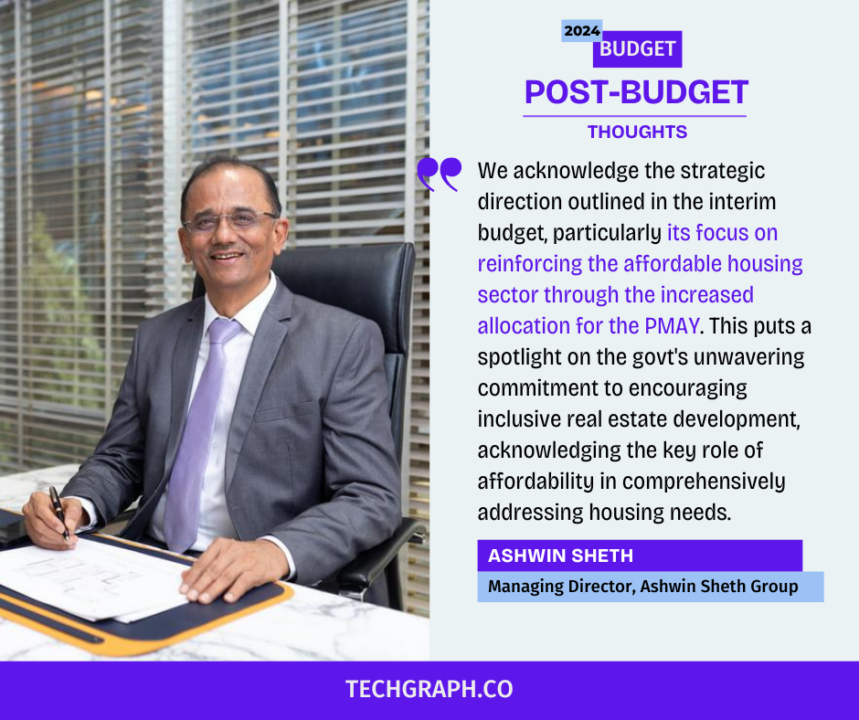
We acknowledge the strategic direction outlined in the 2024 interim budget, particularly its focus on reinforcing the affordable housing sector through the increased allocation for the Pradhan Mantri Awas Yojana (PMAY). This puts a spotlight on the government’s unwavering commitment to encouraging inclusive real estate development, acknowledging the key role of affordability in comprehensively addressing housing needs.
The allocation of 70% of PMAY houses to women in rural areas is of special significance and will go a long way towards providing secure living spaces and advancing women’s empowerment. The progress in the implementation of PM Awas Yojana (Grameen), approaching the target of three crore houses, with a commitment to taking up construction of two crore additional houses over the next five years, reflects the government’s dedication to meet the growing demand for housing in rural areas.
Maintaining a delicate balance between promoting affordable housing and ensuring sustained growth across all segments is crucial, and will no doubt foster an environment conducive to growth, investment, and the holistic development of the real estate ecosystem.
Moreover, the increased outlay for infrastructure to Rs 11.11 lakh crores in FY25, is a welcome move, giving further support for overall growth and development in the sector. Building on these developments, we look forward to continuing to help develop a robust and inclusive real estate landscape in India.
Srishti Dhir, Founder of Hub & Oak
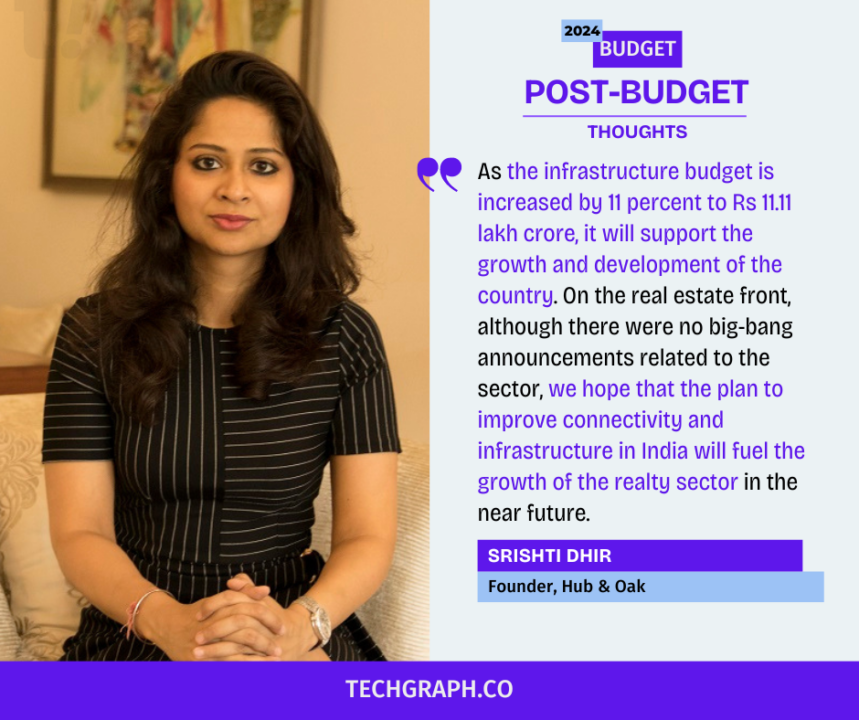
The Interim Budget 2024 lays down the foundation to strengthen the economy and infrastructure of India. We believe this year’s budget had something for everyone, especially for the poor and weaker sections of society. To promote affordable housing in the country, Finance Minister Nirmala Sitharaman emphasized the government’s plan to launch a new scheme to help the middle class living in rented houses or slums. Further, the allocation of 70% of PMAY houses to women in rural areas also reflects a positive transformation.
The progress in the implementation of PM Awas Yojana Rural in the last few years is highly commendable as the govt is reaching closer to its target of 3 crore houses. Also, their commitment to build two crore additional houses in the next five years shows the Modi-led government’s dedication to meet the growing demand for housing in Tier 2 and Tier 3 cities. Adding to it, the roof-top-solar installations on 1 crore households providing up to 300 units free every month is a win-win proposition for the power sector.
As the infrastructure budget is increased by 11 percent to Rs 11.11 lakh crore, it will support the growth and development of the country. On the real estate front, although there were no big-bang announcements related to the sector, we hope that the plan to improve connectivity and infrastructure in India will fuel the growth of the realty sector in the near future.
Navin Dhanuka, MD & CEO, ArisUnitern RE Solutions
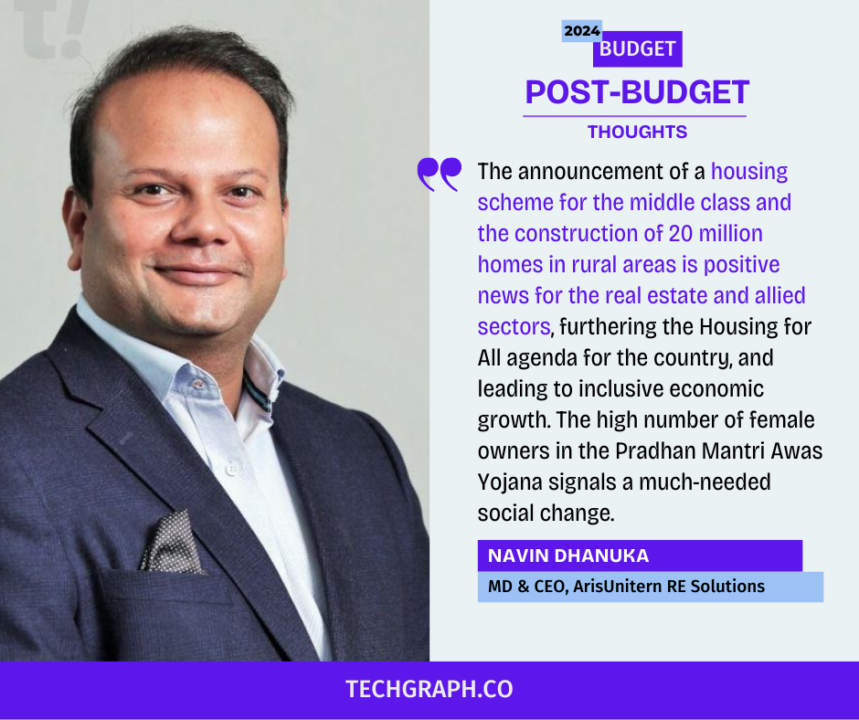
Owning a home in India may not be difficult anymore with the investment environment turning more and more accommodating. The interim budget presented by the Finance Minister today furthers that commitment to aspiring home buyers as the investment environment remains conducive.
The announcement of a housing scheme for the middle class and the construction of 20 million homes in rural areas is positive news for the real estate and allied sectors, furthering the Housing for All agenda for the country, and leading to inclusive economic growth. The high number of female owners in the Pradhan Mantri Awas Yojana signals a much-needed social change. Given that India aims to tread on the path of being a developed nation with women in the front, their economic empowerment remains crucial.
The budget today paves the way for more investments – both domestic and FDI, through the extension of tax benefits till 2025 to startups and investments by sovereign and pension funds. Since the real estate sector remains a key growth promoter and is anticipated to grow with a CAGR of 9% by 2028, we are hopeful that the announcement will continue to spur private investments in the sector.
Ajit Venkataraman, MD, Finolex Industries Ltd
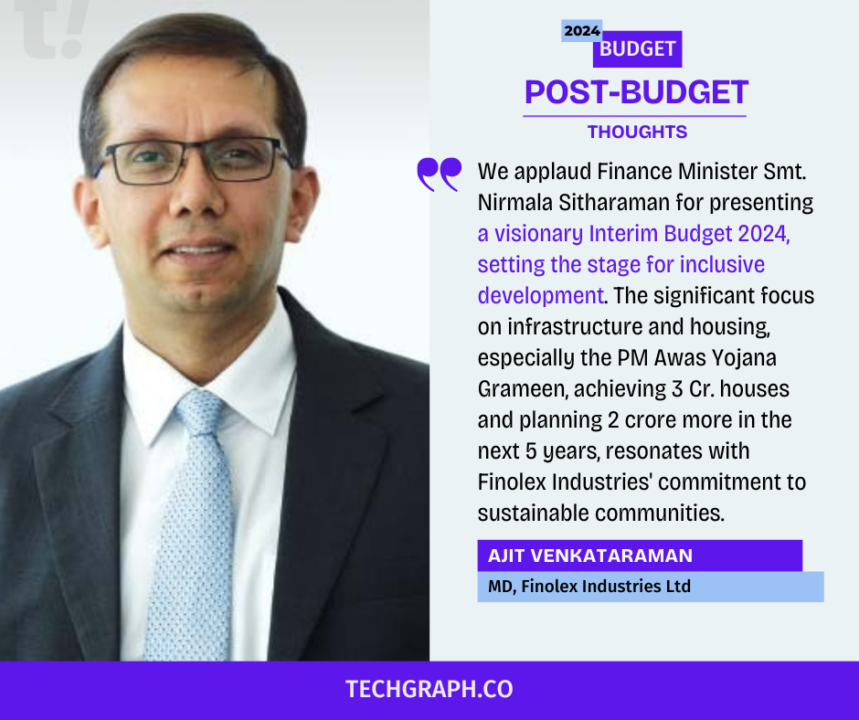
We applaud Finance Minister Smt. Nirmala Sitharaman for presenting a visionary Interim Budget 2024, setting the stage for inclusive development. The significant focus on infrastructure and housing, especially the PM Awas Yojana Grameen, achieving 3 crore houses and planning 2 crore more in the next 5 years, resonates with Finolex Industries’ commitment to sustainable communities.
Ahsan Karim Khan, Chairman, Splice Ply
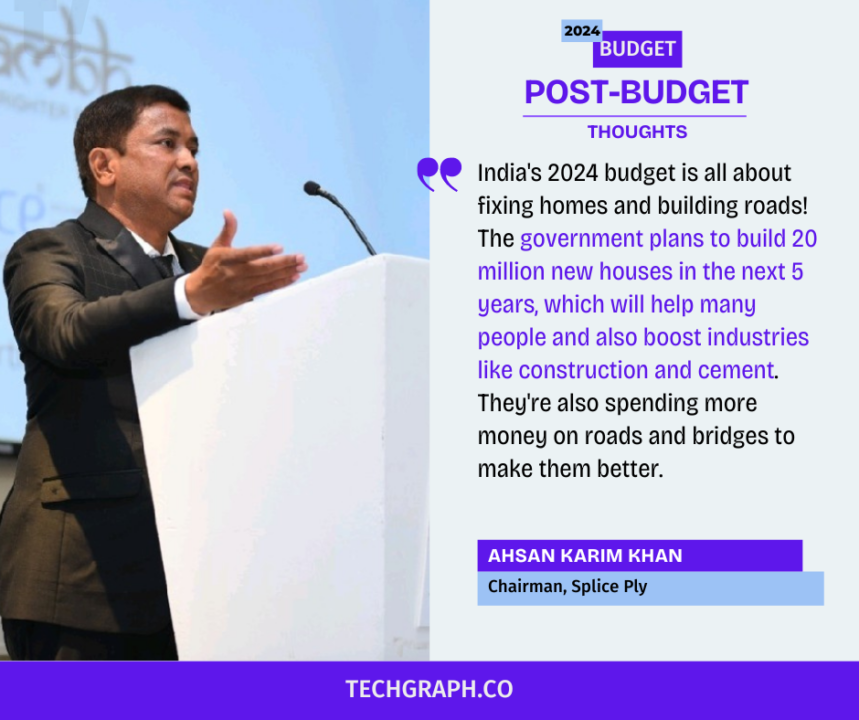
India’s 2024 budget is all about fixing homes and building roads! The government plans to build 20 million new houses in the next 5 years, which will help many people and also boost industries like construction and cement. They’re also spending more money on roads and bridges to make them better. India’s economy is doing well, and the government thinks it can be one of the fastest-growing soon. To help with that, they’re giving some people a tax break, so they can save more money. This budget is good news for everyone, from homeowners to construction workers, and it should help India keep growing strong.
Ratan Sehgal, MD Hybon Elevators and Escalators
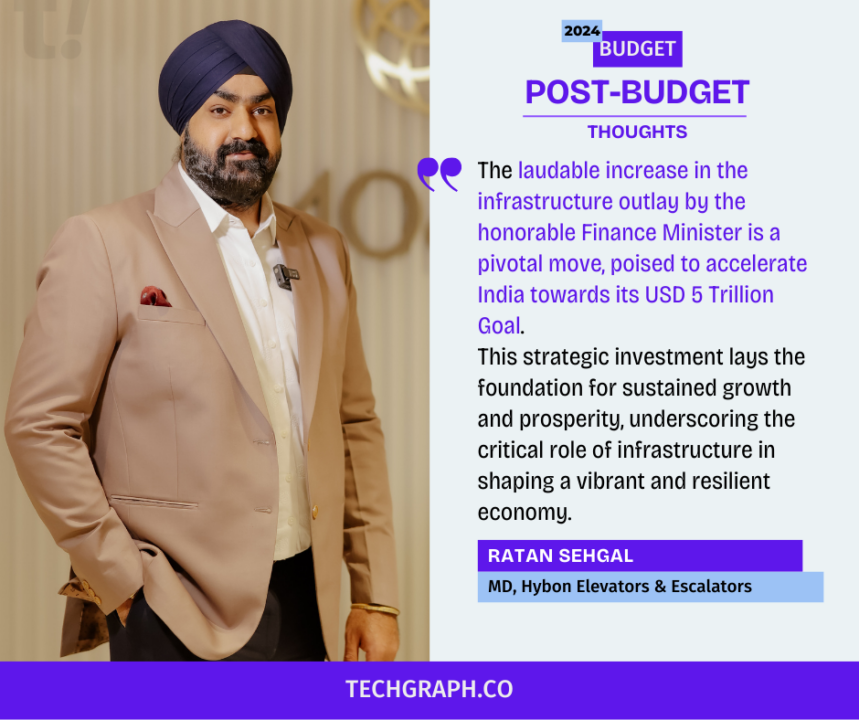
Infrastructure growth is the cornerstone of economic development, spanning industries from essential construction materials to finishing touches like painting and flooring. The expansion of commercial and residential infrastructure not only stimulates related industries such as elevators, HVAC, and solar power utilities but also fuels employment, mobility, communication, industrial growth, and housing solutions.
The benefits are myriad, showcasing the transformative impact of robust infrastructure. Globally, infrastructure has proven to be the key driver of a country’s development and economic prosperity. The laudable increase in the infrastructure outlay by the honorable Finance Minister is a pivotal move, poised to accelerate India towards its USD 5 Trillion Goal. This strategic investment lays the foundation for sustained growth and prosperity, underscoring the critical role of infrastructure in shaping a vibrant and resilient economy.
Mrinaal Mittal, Director, Unity Group
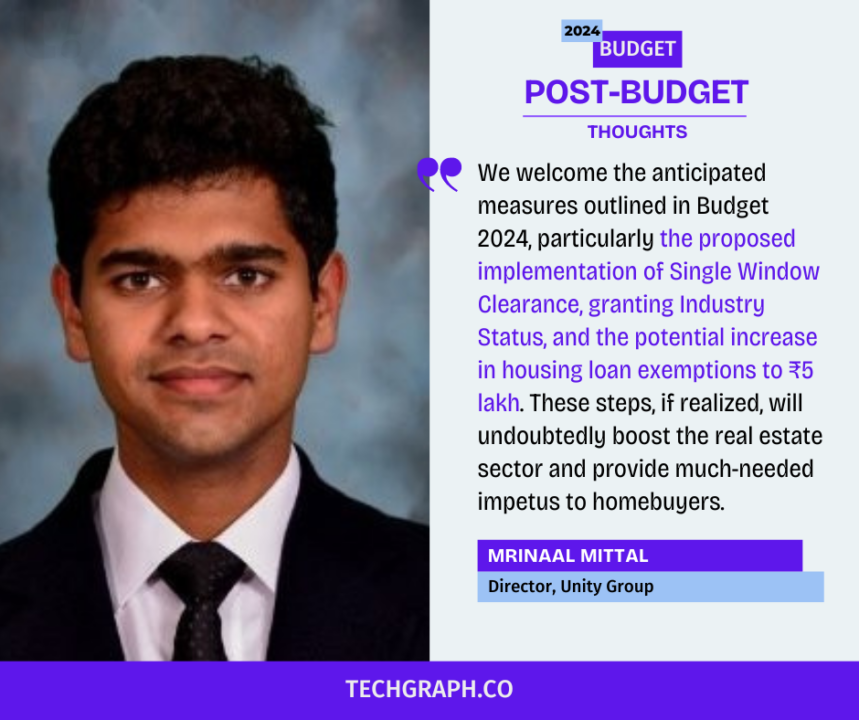
We welcome the anticipated measures outlined in Budget 2024, particularly the proposed implementation of Single Window Clearance, granting Industry Status, and the potential increase in housing loan exemptions to ₹5 lakh. These steps, if realized, will undoubtedly boost the real estate sector and provide much-needed impetus to homebuyers. It’s encouraging to see the focus on infrastructure, a key driver of economic growth. The positive impact on the Gurugram real estate market underscores the potential benefits of such initiatives. We look forward to the detailed budgetary provisions and their execution to drive sustained growth and development.
Pavan Kumar, Founder & CEO, White Lotus Group
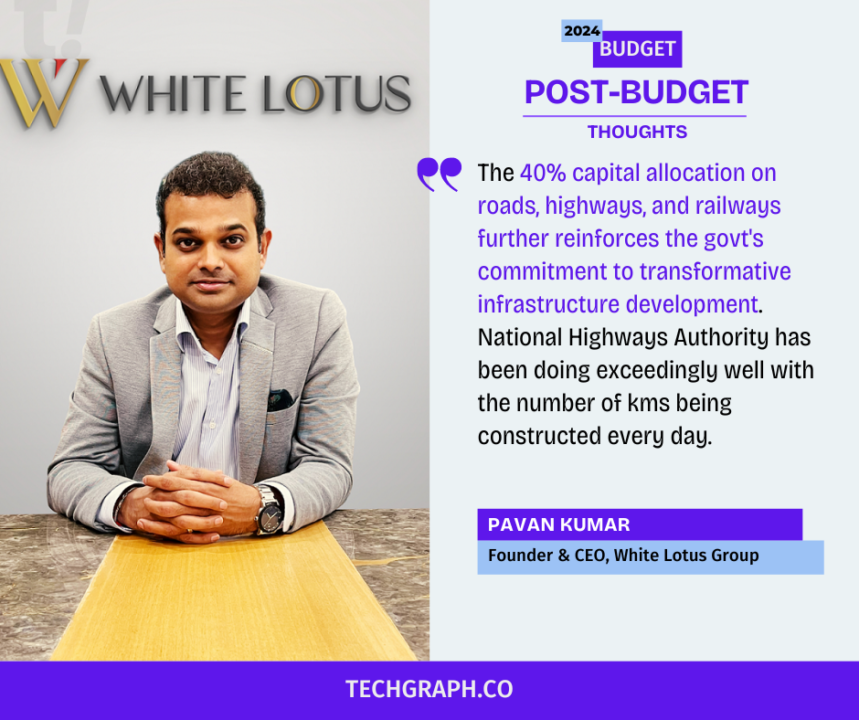
As we have stressed in the past, strategic urban planning under the satellite towns development has to be adopted and implemented in order to alleviate pressure in tier 1 cities like Mumbai, Delhi and Bangalore.
The 40% capital allocation on roads, highways, and railways further reinforces the government’s commitment to transformative infrastructure development. National Highways Authority has been doing exceedingly well with the number of kms being constructed every day. This will further expand the connectivity between urban centers and surrounding satellite towns giving a boost to housing, and further increasing the contribution to GDP from the current 7% to 10% and above.
As infrastructure expands to satellite towns, land prices and construction costs become increasingly viable for real estate developers. Through this, we shall be able to deliver housing projects that suit aspirational middle-income households within reach of major urban employment hubs. This not only provides employment opportunities in the construction sector but also reduces pollution specially from cities like Delhi and improves living standards over time by decongesting tier 1 cities.
We appreciate the government’s vision in promoting satellite town development through prudent infrastructure spending. This budget sets the stage for equitable and sustainable urbanization. We look forward to even greater emphasis on this in future budgets.



